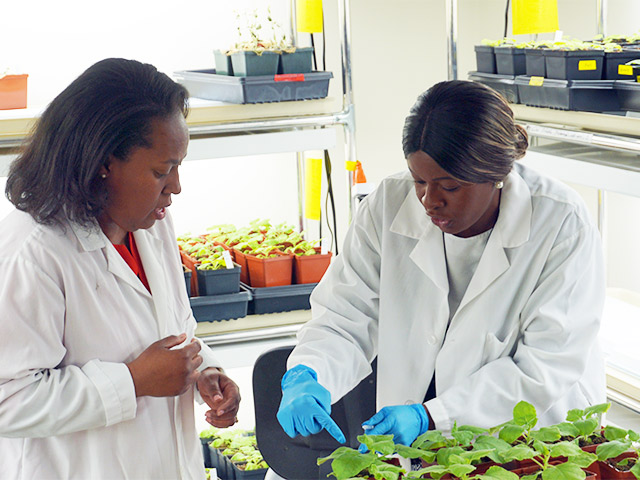Danforth Center Graduate Student Dr. Amie Fornah Sankoh Becomes the First Deaf, Black Woman to Receive a PhD in a STEM Discipline
On Friday, April 21, graduate student Amie Fornah stood in front of friends, family, and colleagues in the Danforth Center’s Langenberg Theater and defended her thesis. Upon her successful defense, Dr. Amie Sankoh became the first Deaf, Black woman to receive a PhD in any STEM discipline.
Amie joined the Danforth Center along with Dr. Tessa Burch-Smith and her lab in 2021. As a PhD student from the University of Tennessee, Knoxville, Amie’s research is focused on intercellular signaling in plants. Completing a PhD is a challenging undertaking for anyone; to do so without easy access to the kinds of verbal communication that hearing people take for granted, along with the unique challenges of being a Black woman in science, requires a whole different level of determination.
But anyone who knows Amie will tell you that she is not one to be easily deterred.
"She is always smiling, always happy, always warmly greets everyone she encounters,” said Tessa. “Amie brings this spirit with her everywhere she goes. She accomplishes things even though she is terrified – and this PhD is no exception.” Amie took on the challenge of getting accepted and completing grad school as a Deaf person in an environment that had never had a Deaf PhD student.
“I believe we are all born to do what can’t be done.”
- Dr. Amie Fornah

Tessa, who had some prior experience working with Deaf undergraduate students, was one of Amie’s biggest supporters as she worked toward her PhD. Within the lab, Tessa established a policy to ensure that Amie had equitable access to everything: “If Amie couldn’t do it, nobody could do it,” she said.
Beyond the lab, the two of them worked together and refused to accept unsatisfactory accommodations from anyone or any organization. In doing so, they pierced through access barriers that had never been breached. For example, because of Amie, the American Society for Plant Biologists (ASPB) provided interpreters at their annual meeting for the first time ever. As a direct result, there is now a permanent budget line for Deaf scientist access at the annual ASPB conference.
“I am fortunate to have a mentor who supports my academic and professional pursuits,” Amie says. “Graduate school comes with a lot of requirements. Having a mentor who advocates for me and accommodates my educational needs lifts a huge burden from my shoulders. This helps me focus on the science instead of stressing about requesting accommodations for meetings and seminars.”
Amie presented her thesis, Investigating the Effects of Salicylic acid on Intercellular Trafficking via Plasmodesmata in Nicotiana benthamiana, to a full house in-person and a virtual audience of over 150 people. Amie thanked her parents, who always encouraged and supported her in pursuing her education. She also thanked the community at the Danforth Center for welcoming and including her. Here, she said, she did not feel like a Deaf person struggling to make it. She felt like a scientist.
“A huge factor that contributes to my success is communicating with other scientists at the Danforth Center.” Amie said. “The open and collaborative environment prevents me from feeling isolated. This is very uncommon in the workforce, especially when you are the only Deaf person.”
She added, “Creating inclusive and accessible space is important—not just for myself, but for everyone. I have amazing friends here at the Danforth Center that have supported me completing my PhD journey, and I didn’t have to feel alone. That’s one thing I love about the Danforth Center – the amazing teamwork!”
The Danforth Center community has greatly benefitted from Amie’s kind and collaborative spirit. “I am proud of the many ways in which the Danforth Center embraced and included Amie.” said Danforth Center President and CEO Jim Carrington. “Amie is a pioneer who has earned our respect, admiration, and appreciation, and who has taken the Danforth Center to a better place.”
Amie may be the first person to achieve this milestone, but she knows that she will not be the last. “My one take-home lesson moving forward is that the unique life experiences of all disabled and non-disabled people alike bring different perspectives to research advancement, problem-solving, and innovation to the world. We should always be willing to address and adopt different strategies to increase accessibility,” she said.
“The world may try to teach us that we can’t, but I believe we are all born to do what ‘can’t’ be done.” Amie added. “This reminds me of a quote by St. Francis of Assisi, which has guided me through my entire life: ‘Start by doing what’s necessary; then do what’s possible; and suddenly you are doing the impossible’.”